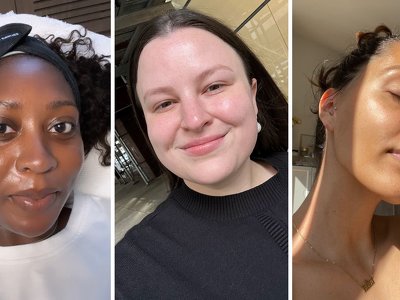What It's Like to Try an Open Marriage After 10 Years of Monogamy

Welcome to Doing It, a column by sex educator and writer Varuna Srinivasan. This month, we look at the experiences of couples who decided to give polyamory a try after many years of monogamy.
Neféli was in a marriage for over 12 years before she and her partner decided to open things up. The 31-year-old pastry chef, who lives in Greece, offered the background story of her partnership — a marriage that has since ended. After years of being together, Neféli recalls, she and her now ex-partner considered indulging in a threesome as their first foray into polyamory.
"We opened our relationship this summer, after 11 years of being together in a monogamous relationship where even flirting we considered cheating," Neféli explains. "We had a very strong foundation with excellent communication and honesty, so we felt it was safe to take that step."
When you have been together monogamously for as long as they have, it can be daunting to approach an all-new relationship structure. Someone in a polyamorous relationship can have more than one relationship at a time. Everyone involved is aware of and consents to being in the relationship. Depending on whether a couple decides to open up their relationship sexually, romantically, and/or emotionally, the terminology and hierarchy can change.
Even those who only date monogamously, or who do not date at all, have probably heard the polyamory-related term ethical nonmonogamy. Unlike unethical monogamy — in other words, cheating or infidelity — partners who practice ethical nonmonogamy are open about their partners outside their marriage and oftentimes these relationships might be purely sexual. Swinging, open relationships, and "monogamish" relationship types all fall under this umbrella.
In polyamory, people can be romantically, emotionally, or sexually polyamorous and those who were initially monogamous can open up their relationship for any number of reasons.
Ashwathi, a 25-year-old business analyst living in New York City, opened up her relationship with her partner after seven years of monogamy when she became aware that she wasn't straight. "My partner and I first opened up our relationship in 2018 when I realized I wanted to explore my bisexuality, which I never had a chance to do up until that point," Ashwathi says. "Initially, it was an open relationship — I was only engaging with other people sexually, not romantically."
“After 11 years of monogamy where even flirting was considered cheating, we opened our relationship up.”
Many couples might opt to close off their polyamory to romantic and emotional attachments. A potential fear in opening up your relationship or marriage is that you might lose your partner to someone else. For Ashwathi and her partner, it made sense to initially explore sex-only experiences, but they eventually decided to pursue romantic ones, as well.
"After a few years of [having sexual partners other than one another] and realizing that I wanted romantic connections as well, I [came to understand that] I was polyamorous and discussed this with my partner," recalls Ashwathi. "After considering our options, we decided to fully open the relationship in 2021. He took it a lot better than I expected." She cites open dialogue and honesty as being the main factors in helping the pair find a solid rooting in their polyamory.
"If a couple has been monogamous for [close to a decade] and wishes to open up their relationship, the most crucial things to discuss are their respective reasons for pursuing polyamory," Leanna Yau, a polyamory educator and content creator at Poly Philia, tells Allure.
"To find joy in polyamory, people should have their own boundaries [as individuals]," says Yau. "While many people think automatically about sexual boundaries when it comes to open relationships, identifying emotional ones can be very helpful early on in dating multiple people."
Especially in the beginning, as you navigate new territories and insecurities, over-communication is the way to go, according to Kate Manser, a licensed professional therapist and the founder of Polyamory Therapy.
"When it comes to established couples practicing polyamory, they will need to over-communicate their own emotions, wants, and needs to partners," says Manser. "Even if you have been together for 15 years and feel as though your partner can read your mind, you will need to verbalize your emotions and requests to your sweetie. The very nature of your relationship is now changing and many things that have been implicit now need to be made explicit so you both understand each other to the best of your abilities."
By Aliza Kelly
By Marci Robin
By Emily Newhouse
Whether or not a couple finds joy in polyamory is dependent on the existing foundations of their relationship. A new structure might work best for someone who is already in a stable and loving partnership. Opening up your relationship simply for excitement — for instance, you're afraid that you two are lacking spice, losing interest in each other, or are growing bored — might not be the best impetus to explore polyamory.
Remember: Polyamory can't fix a relationship.
This brings me to an important point: Polyamory cannot fix a relationship. If a partnership is no longer working for an unrelated reason, the choice to explore polyamory is unlikely to provide the Band-Aid one or both partners are looking for. For instance, while Neféli is no longer with her partner, she does not cite opening up her relationship as the cause of their separation.
"Polyamory is not a solution to a boring [or] dying relationship, nor a way to spice things up," Neféli cautions. “I don't know what I could have done differently, because I feel my marriage was already ending anyway, so I can't see what was a 'mistake' in approaching polyamory and what was the natural path of this particular relationship.”
If you are contemplating opening your own relationship up or exploring ethical nonmonogamy, consider the following tips.
If you are someone who feels like you might get jealous or insecure with external partners, it might be essential to establish a relationship "framework." How do you two want to structure your relationship? Couples who open their relationship can choose to structure their relationships in two ways: hierarchically or non-hierarchically. This can go beyond sex, developing into something romantic or emotional.
In a hierarchical polyamorous relationship, one relationship serves as the primary with an "anchor," while all other relationships outside of it are considered secondary. Some people might find solace in a hierarchical relationship, while others, like Ashwathi, prefer to give all their partners equal attention. This includes prioritizing yourself and your needs, as it relates to different partners.
In non-hierarchical polyamory, there are no primary partners nor anchors. Everyone in the relationship is prioritized the same and big decisions are made together as a group.
As obvious as it sounds, this is where many couples' efforts fall short, which may lead to confusion, hurt feelings, and resentment. Strong communication and clearly laid-out boundaries are the best way to approach that initial entry into the polyamory world. If you're not already accustomed to dialoguing together, consider going to therapy together, where you can work through your feelings in a safe setting.
By Aliza Kelly
By Marci Robin
By Emily Newhouse
Ask yourself, even if you think you already know: What are your boundaries? "Try to identify what your 'emotional ceiling' is [in] new relationships," says Manser. "Do you want to find new friends that could develop into a sexual relationship or [do you want to] develop a deep, intimate connection with someone else and fall in love? Or perhaps something in the middle?"
A major area of discussion that anyone with multiple sexual partners should feel comfortable discussing with all of their partners is sexual health and STI testing. Depending on the relationship structure, practice debriefing about your sexual history with your partners every once in a while. You can even schedule a group-testing date if that's something you're all open to!
If you start to feel like dating or having sex outside of a monogamous relationship structure is overwhelming and you find yourself retreating back to monogamy, that's OK. Go easy on yourself. If you’re daunted, you can always take a break, then try again.
Ultimately, the choice to explore polyamory is yours. Just understand that the journey is not one size fits all. Take the time to enjoy the process. Be sure to regularly remind yourself that you’re doing great and that, at the end of the day, whether you are single, monogamous, or polyamorous, love is abundant.
Read more stories about sex and sexuality:
- Last
News by day
27 of April 2024







